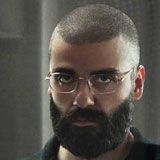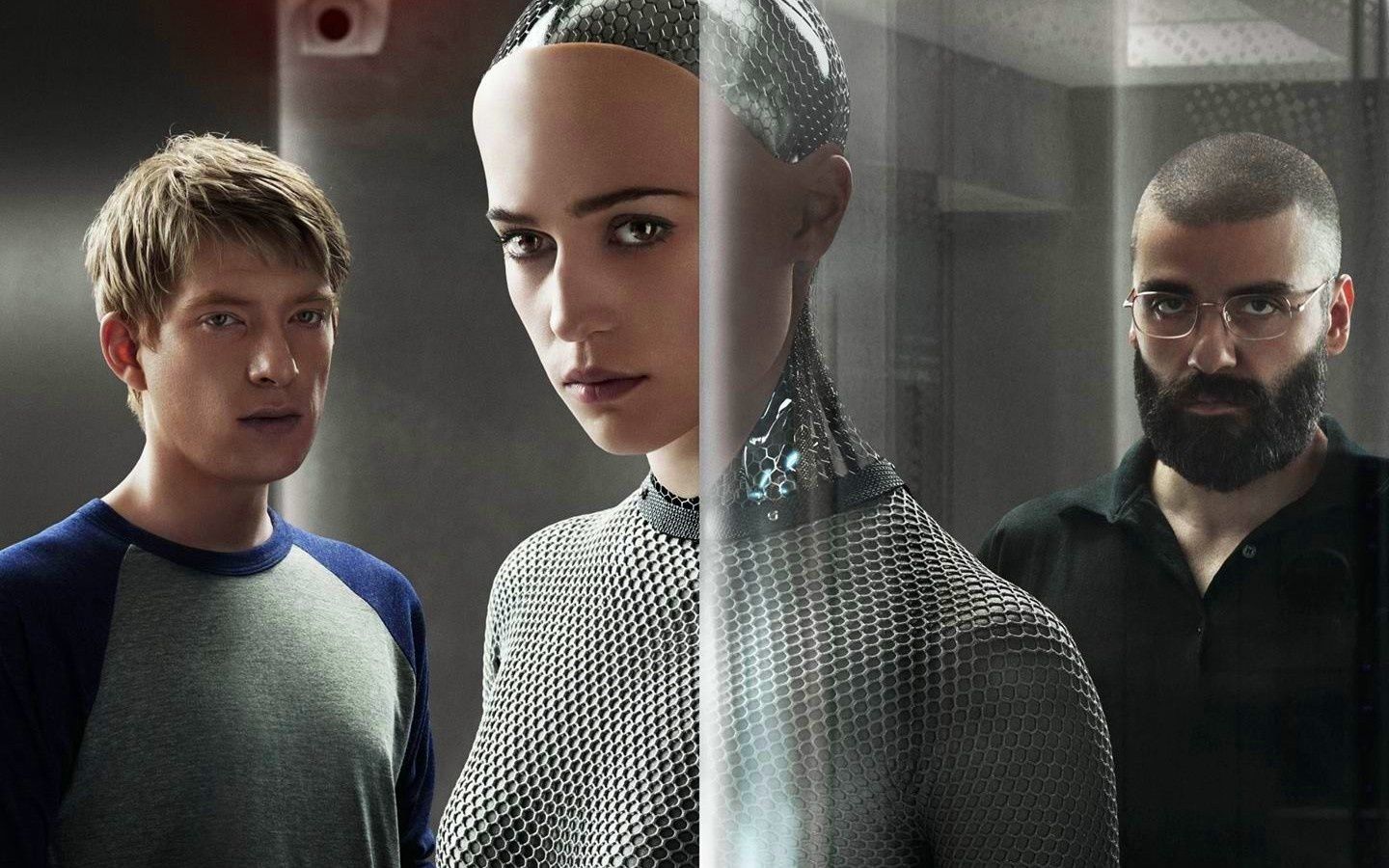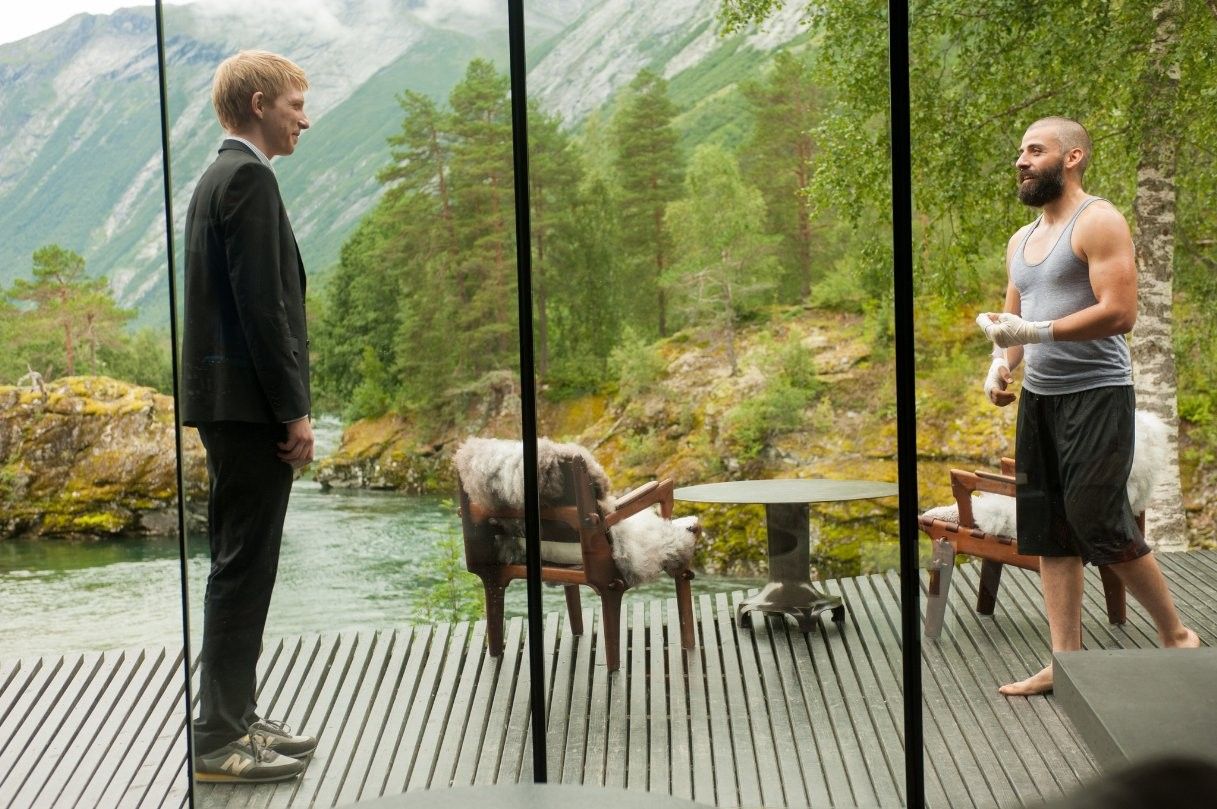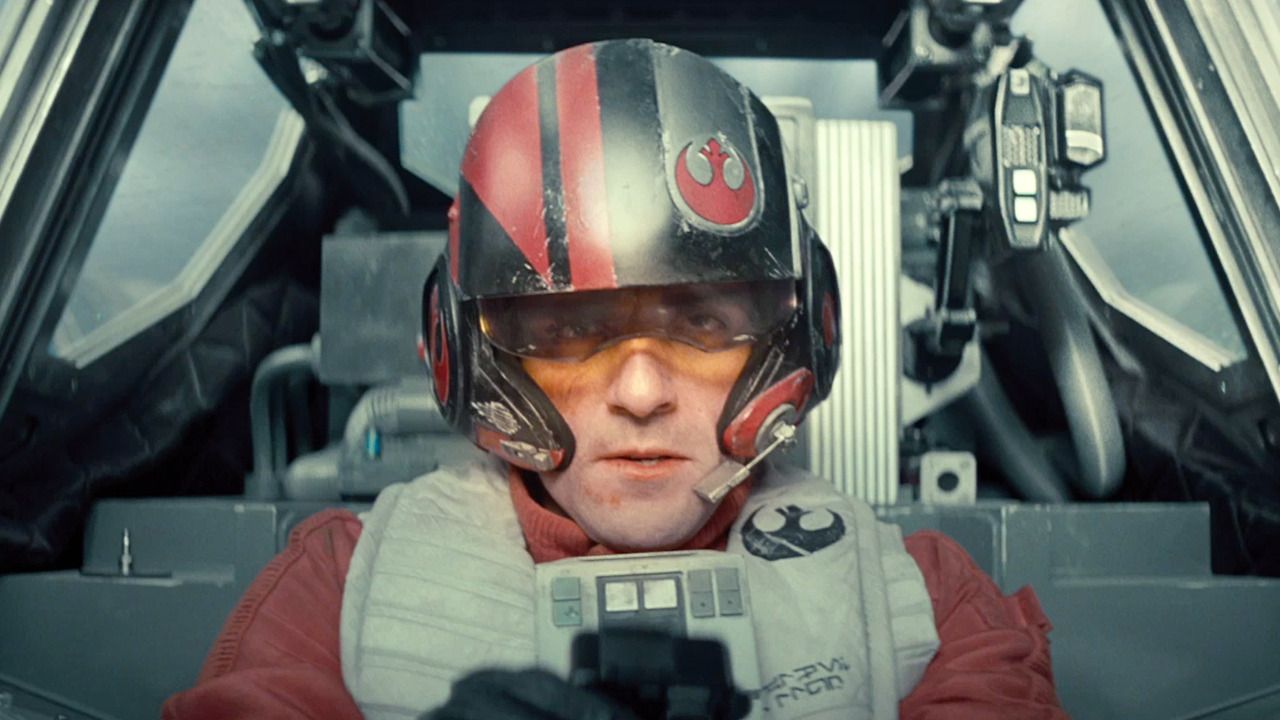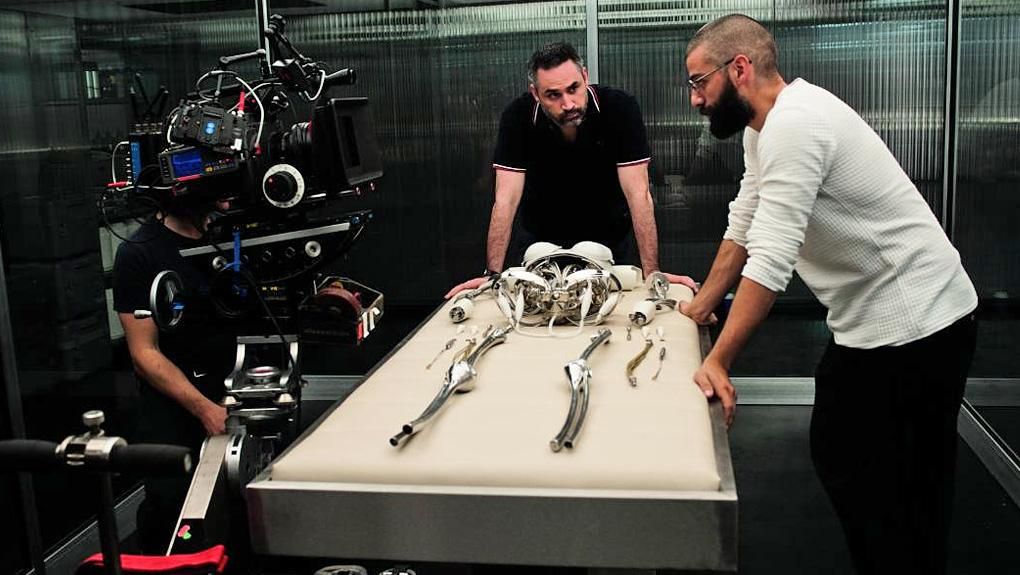Oscar Isaac has just become a science fiction movie star. And we're not talking about “Star Wars: The Force Awakens.”
In “Ex Machina,” the meticulously crafted A.I. thriller that marks the directorial debut of “28 Days Later” screenwriter Alex Garland, Isaac delivers a measured yet impressive performance as a brilliant but eccentric tech CEO named Nathan who summons a low-level employee (Domnall Gleason) to his secluded enclave to administer a Turing Test to the shockingly human-seeming android Ava (Alicia Vikander). In fact, she’s so human that she secretly raises serious concerns regarding what Nathan has planned for her.
Even as Isaac garners attention for his captivating turn in an equally mesmerizing film, two major genre projects lie ahead for him: the eagerly anticipated seventh “Star Wars” movie, in which he plays fighter pilot Poe Dameron, and “X-Men: Age of Apocalypse,” in which he stars as the title villain.
In this interview with Spinoff Online, Isaac shared his thoughts on all three of his ventures into sci-fi filmmaking.
Spinoff Online: I don’t know if this totally is the reaction I’m supposed to have to this man, but I loved him. He is such a fascinating character.
Oscar Isaac: That’s definitely that reaction you’re supposed to have.
What got under your skin with him? What was the thing that made you say, "I want to walk around and be this guy for a while"?
I just loved how many steps ahead he always was. What a manipulator he was in the most amazing sense, in a baroque sense. There was like, not only 25 moves ahead, but to the right, to the left and backwards. The whole movie, to a certain extent, is an expression of this guy. Every room that you see, every line, every pane of glass, her to a certain extent, even Caleb, his sensibilities – everything has been programmed by this one brain. And it’s a brain that’s troubled and fatalistic and misanthropic and tragic as well.
Review: A Modern Masterpiece, "Ex Machina" is a Must-See Film
And also the presentational aspects of him. Part of seeing those many moves ahead, part of creating this experiment – which is all he’s doing, he’s just making an experiment – is he has to play a role. And the role-playing that happens. One, I’m your friend. Two, I’m a villain that she – that is, the machine – needs to be saved from. Actually, he’s a prophet, he’s a shaman, he’s all these elements – and he’s a dumb drunk as well. He’s a brute, and he’s misogynistic. And he’s got a very, I would say, almost juvenile sense of sexuality. And so all these things, and on top of it all, he always tells the truth. He’s not a liar. So everything he says, even if it’s a manipulation, he’s actually telling the truth, and his argument stands up. His argument even stands up to science and the different philosophical ideas. Sure, he’ll side on certain sides, but for the most part, everything he says stands up to scrutiny.
Like all great sci-fi tales, this story raises questions, prompts thoughts about different aspects. What got into your head as a result of the story? What did you find yourself really contemplating?
Consciousness. The nature of consciousness, which I think is at the root of artificial intelligence. The idea that this particular quality, the fact that one can never express truly what existence feels like. We can both describe drinking this cup of coffee, but you’ll never really know if your experience is completely alien to mine. I think art maybe is the closest thing to communicating experience. But even then, you just don’t know.
Again, also if you work to try to create something that could be self-aware, in a way, you have to strip consciousness of its importance and realize maybe it’s just a byproduct of other things happening and see other things that are more important. And this feeling, the feeling of a little man inside this machine telling it which way to go, that’s actually just the phenomenon. It’s a lie. It’s a ghost trail of what’s really happening which is just you taking in information. You just experiencing stimuli and processing it. And part of the smoke that comes out of the process is the feeling of a soul.
The last few big movies that we’ve seen you in – Inside Llewyn Davis and A Most Violent Year, most notably – have been very grounded, human stories – as is this film, despite the trappings. Did you find it easy to make this story accessible for people? Did you see all the ingredients were right there? The sci-fi premise didn’t create a distance?
Again, actually, to the root of the idea, which is, I can never know what other people’s experiences, all I can go by is my own, which is when I read it, I was like, I get this. I totally understand it. I find it fascinating. I find it hilarious on top of that. That was one of the most fun things about playing Nathan, which is playing a quite extroverted and really funny guy. That it was appealing and it dealt with these very big questions and big ideas in a way that I could understand. And not only that, it used language and these ideas to push the story along. So the action set pieces are actually two people torturing each other with their brains, as opposed to a car chase or something. And that’s rare for an actor to be a part of.
The physical traits were interesting too. Were a lot of those your choices, or were they in the script?
Well, as far as the working out, that was definitely in the script. He is someone that liked to work out a lot and had a punching bag. What was interesting is that in my research I came across Bobby Fischer as a real source of inspiration, because he was someone that was quite misanthropic and very angry, as well as being brilliant. And he had an Olympic trainer while he was preparing for his big chess battles against the Soviets. So I found that really fascinating.
We talked a lot about his physical traits. We played around with ideas. At one point with Nathan, we decided he did have long, long hair, because why would he cut it if he’s been alone up there? But then we played with that idea and that went away. [Stanley] Kubrick was someone else that I really got inspired by. I just love that bald head with the glasses and the owl eyes and the big beard. So we ended up going with that.
There’s definitely Kubrickian kind of vibe in all kinds of corners of the film, too, which is cool. Storytelling using fantastic elements: You’ve got this project and you’ve got a couple more. They’re all different approaches. This is a more traditional sci-fi with a very human baseline. Then you’re doing more of a fantasy/adventure with “Star Wars: The Force Awakens,” and then a comic book superhero kind of story with “X-Men: Apocalypse.” What appeals to you about each of those different angles in making a movie?
For me, again, it does come down to this: Each movie is an opportunity to have a meditation on a particular set of themes. Sometimes those themes are explicit, and sometimes they’re my own that come up from just reading this that aren’t necessarily what was intended but yet are inspiring to me.
So with this, the idea of consciousness was fascinating to me. With “Star Wars,” apart from the cultural phenomenon that it is, the fact that it is something that I grew up with, the fact that it was J.J. Abrams – a lot of those aspects. But as far as me playing the character, the idea of war set in this kind of mode, particularly the ecstasy of war, was interesting to me for purposes of my character and exploration of that character. That was just a fascinating thing from the spiritual aspects of it.
And with “Apocalypse,” again it’s the same thing. I try to get down to what do I want to think about a lot when I’m forming this character that can form all my choices. And with that, getting back to the biblical inspiration of that character. It’s like, why did this woman ["X-Factor" writer Louie Simonson], why, when she was tasked in creating an arch-villain, did she pick Apocalypse? I understand it because as a kid, that was the scariest thing you could possibly think of, which is the Second Coming, the Apocalypse, the Four Horsemen.
At that particular moment in time, too.
Yeah, in the ‘80s. Pestilence, war, death – all of that meant being left behind. All these themes are so scary. Ultimately, why was that, going back even further into the actual writings of John and Revelation, why was that the inspiration? Getting back to those ideas of expression, that’s what I like to look for.
Can you give me a compare/contrast look at the special effects and working with them as an actor in a movie like “Ex Machina” – smaller-scale but still very convincing special effects – and a movie like “Star Wars,” in which you have everything possible in the toy box available to you. Can you kind of give me a sense of the difference between the two?
Yeah. I’ve got to say, nowadays, the technology has moved forward to such an extent, that it doesn’t really get in the way of anything. With “Ex Machina,” there wasn’t a lot. She had her gray suit on, and that was it. They would do a pass without anybody in it every once in a while, but the truth is, it just felt like making a movie without effects. With “Star Wars,” there were huge set pieces, but the stuff was mostly built – the things that we were interacting with – so again, it wouldn’t get in the way of the actual act of performing.
Talking about that pop cultural impact that you’re about to have, let’s dig into that a little bit more. What does that mean to you? Are you prepared for the "instant icon” quality that’s going to entail for you?
Well, no, I don’t know how you prepare for that, or how you assume that’s going to happen. But that’s not my favorite part of it, the over-visibility. I do like flying under the radar a lot. But I also understand that once you get these movies, a lot more people see them and a lot more people recognize you. But you know, the challenge will be how to continue to surprise and to shift shape [laughs] and continue to do what I’m doing, which is play vastly different characters from thing to thing, which is so fun.
When you get done with your second blockbuster-scale movie with “X-Men,” do you want to do a palate cleanse and go small again and find something really low budget?
To be honest, I’m looking to go on stage again, which definitely would be a palate cleanse. But I’m not as calculating that way. Again, if a role comes to me and a story comes to me that’s another big one I find something that’s super inspirational in it, I wouldn’t say I’ve done those big ones, so between action and cut, it’s always the same. That’s the secret space where you get to play and you get to live out this consciousness, this meditation that you’ve been playing with. But getting back on stage is a big thing. I’m preparing to do “Hamlet,” which will be a lot of fun. Get digging into that, I’m going to do that in New York.
The last few years have been a great sweet spot for you professionally. Can you talk about having that tumbler click all of a sudden? People in Hollywood wanting to take meetings with you and wanting to write stories about you, but also on top of that, getting amazing acting opportunities.
It’s wild. It’s an incredible thing. It’s what I always hoped. It’s the idea that I was after when I went to school, at some point all this will translate into me getting to do this every day. And I am a nerd about it – I love it. I’m always thinking about it, the actual parts of creating something and collaborating with someone, the director and the writers and the costume designers. For me, the preproduction part is the most fun because it’s when there’re endless possibilities. And so yeah, the fact that I am in a place now where, at this point, it’s the first time I’m actually having to choose between "This is great and "This is great. How do you say yes to one and say no to the other?" It’s definitely a place of privilege. I’m so, so thankful I’m in that place – but it's also a difficult one, a challenging one.
”Ex Machina” opens today in select theaters.

